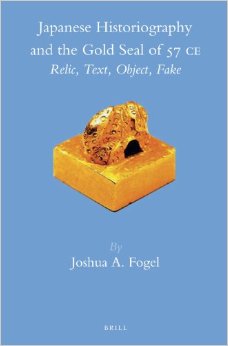Dear members of the department,
I’m sure you’ll all want to join me in congratulating our colleague Josh Fogel for his book: Japanese Historiography and the Gold Seal of 57 C.E. Relic, Text, Object, Fake.
Here’s a brief description of the volume:
This new book is a carefully researched and wonderfully thoughtful exploration of the transformations of an artifact as read through the transformations in the way that artifact has been understood historically. Japanese Historiography and the Gold Seal of 57 C. E.: Relic, Text, Object, Fake follows the biography of a gold seal that was purported to have been given by Emperor Guangwu, the founding ruler of the Later Han dynasty, to an emissary from what’s now Japan in the year 57 CE. If we believe in the veracity of its provenance (and not everyone does), this object is both the only seal of original Chinese provenance that’s been found in Japan, as well as the oldest extant material object (at least, the only one for which we have corroborating evidence) that passed from the mainland empire to what is now the Japanese archipelago. Fogel guides readers through more than two centuries of debate that have surrounded the seal in Japan, using the case of the seal to make a much larger point about historical epistemology. By following debates around this particular object, we come to understand the ways that the bases for scholarly debate and the nature of what constitutes believable evidence have changed (and continue to do so) over time. The book thus is a history of history, and a history of conceptions of evidence, as much as it is a history of the transformations of a seal from relic, to text, to object, and finally to (purported) forgery. Japanese Historiography and the Gold Seal of 57 C. E. is thus a fascinating work for anyone interested in the histories of material culture, international relations, epistemology, Japan, and history itself.
On behalf of the Department of History, Josh, many congratulations!
Marcel

